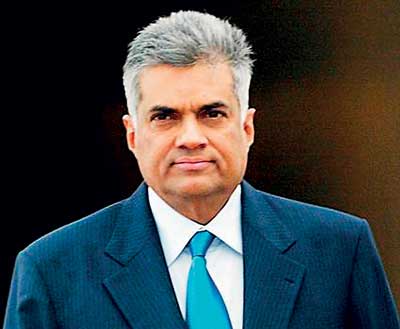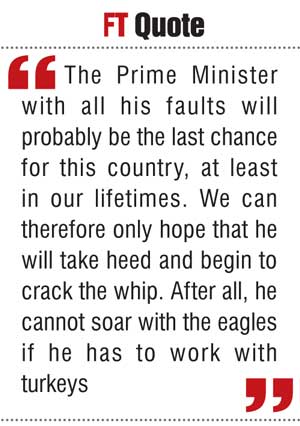Wednesday Feb 18, 2026
Wednesday Feb 18, 2026
Thursday, 17 March 2016 00:00 - - {{hitsCtrl.values.hits}}
By Hourglass
Ranil Wickremesinghe finally came into power after a long wait in the wings. Despite a woeful lack of charisma and an inability to don a mask of populism, he was widely admired for his integrity, knowledge and vision. After years of being subject to scorn, insult and ridicule, he achieved a much-deserved place at the helm of Government in Sri Lanka, albeit in a diluted form.
The Prime Minister undoubtedly has a unique vision and a goal for Sri Lanka. This is refreshing, after years of shallow governance based on ad hocism and opportunism. However, having vision, and achieving goals based on that vision are two different things. The latter requires positive leadership, the ability to maintain discipline and harness teamwork. The Prime Minister seems to fall short in this department. 
Sri Lanka is at a cross road. One path leads to an abyss from where there will probably be no return. The other, the lesser evil, is a rocky, winding path that can eventually lead the country out of its present mess, bruised, but in stronger shape. The challenges of a faltering economy, much of which is undoubtedly due to the wastage and corruption of the Rajapaksa regime, the uncertainties of the global economy, and a unique, bifurcated government requires the Prime Minister to take bold and drastic steps in order to move towards the achievement of his goals.
First challenge
The first of these challenges is to create an infrastructure through which the Prime Minister can implement his vision. This is not easy. Unfortunately, he inherited an infrastructure that was broken and mostly non-existent: brimming with nepotistic incompetents and an abundance of bureaucrats whose morale had been utterly destroyed by intimidation, apathy and a lack of public support. In addition, he has had to share the responsibility of government; accommodate mediocrity (and more often incompetence) to stabilise his government; and to reward those who stood by him during the years spent in the wilderness.
However, the fact is that he controls many of the key ministries which include the Policy Planning and Economic Affairs, Finance, Foreign Affairs, National Development Strategies and International Trade, Tourism, Law and Order, State Enterprises Development, Education, Highways and Investment Promotion and the departments that go with them. It is these that will spearhead the efforts of dealing with the challenges over the near term.
Although he has succeeded in manning some of these institutions with capable, honest men and women, a large number of them have been filled with incompetent and egoistic persons who have achieved nothing since their appointment. These include appointees to some key ministries and vital regulatory bodies.
An objective perusal of their records since their appointment clearly demonstrate that despite their bluster and posturing for the media with promises of reform they have in many cases killed the industries that they were meant to regulate forgetting their mandate. It is time that they are asked to leave and competent replacements found.

Second challenge
The second challenge is to strengthen the institutions that were deliberately destroyed by the previous regime. Many departments that once stood proud and independent were systematically undermined by the previous Government. The Judiciary, the Department of the Attorney General, the Department to Investigate Bribery and Corruption, the Police, the Central Bank and the Securities and Exchange Commission are but a few of them in the news.
The freedom from political interference, a relative improvement under the new regime, has freed these departments from that fear. However, their confidence and morale cannot be rebuilt overnight. It takes time and support and the results mixed thus far.
For instance, the Judiciary is no longer political. However, the laws delays remain unabated and the quality of justice has hardly improved. The broken infrastructure has to be fixed. Being cloistered like nuns in a convent does not help.
The Attorney General’s Department has been ridiculed by friend and foe alike. However, those who are quick to criticise (and that they indeed deserve in many instances) fail to appreciate its workload and that it needs support rather than brickbats.
The Director General of the Department for the Investigation of Bribery and Corruption has shown that change is possible, despite all odds, and perhaps offers a beacon of hope. The jury is yet out on the police.
The institutions that regulate the financial and capital markets, which will bear a crucial burden in meeting the emerging global challenges have been abject failures.
The Central Bank does not seem to have learnt any lessons from the bond fiasco and continues to turn a blind eye to questionable transactions. The recent debacle with Entrust, where no wrongdoers have been taken to task is another incident which leaves one wondering if no one has any sense of accountability for public finds. The Central Bank probably brims with confidence about its ability to gloss over its inaction from the fact that the industry it regulates only whines in whisper.
The Securities and Exchange Commission blindly follows a scorched earth policy. The results are therefore mixed and much work is still required. And this is not all on the list.
Third challenge
The third challenge is to install mechanisms for accountability. Supervision and monitoring of performance is key. Officials should be set targets and asked to report on progress with relative frequency. Those who are unable to deliver should be shown the door. Catchy populist promises which are never kept and camouflaged interviews to fawning journalists should not be tolerated.
The Prime Minister should also equip himself with apparatus to communicate his message in digestible form. Heated words in parliament do not help. Angry words rarely translate into cold logic. The message of ECTA and the SOE holding company in the style of “Tamasek” makes excellent examples. They are sensible “win-win” proposals if only the stakeholders could be made to understand the process, the safeguards, and the benefits. Sadly, this has not been done. Both sides are equally responsible for the polarity caused by abject ignorance and mutual suspicion.
The Prime Minister should keep his ear to the ground. Those who supported the ouster of the Rajapaksa regime are slowly but surely turning away from the Prime Minister whom they admired greatly. Even his closest aides seem to be fast turning into cynics. Many of them are educated and knowledgeable, unlike those who were swayed by the rhetoric of the Rajapaksas. And rhetoric is not the forte of the Prime Minister.
Disillusionment with the system will therefore wipe out a considerable part of his base making the achievement of his agenda more difficult, even if it does not eventually buck him from his position. This would be a tragedy, not only for the Prime Minister but also the country.
The Prime Minister with all his faults will probably be the last chance for this country, at least in our lifetimes. We can therefore only hope that he will take heed and begin to crack the whip. After all, he cannot soar with the eagles if he has to work with turkeys.